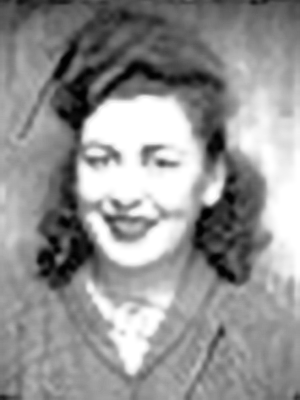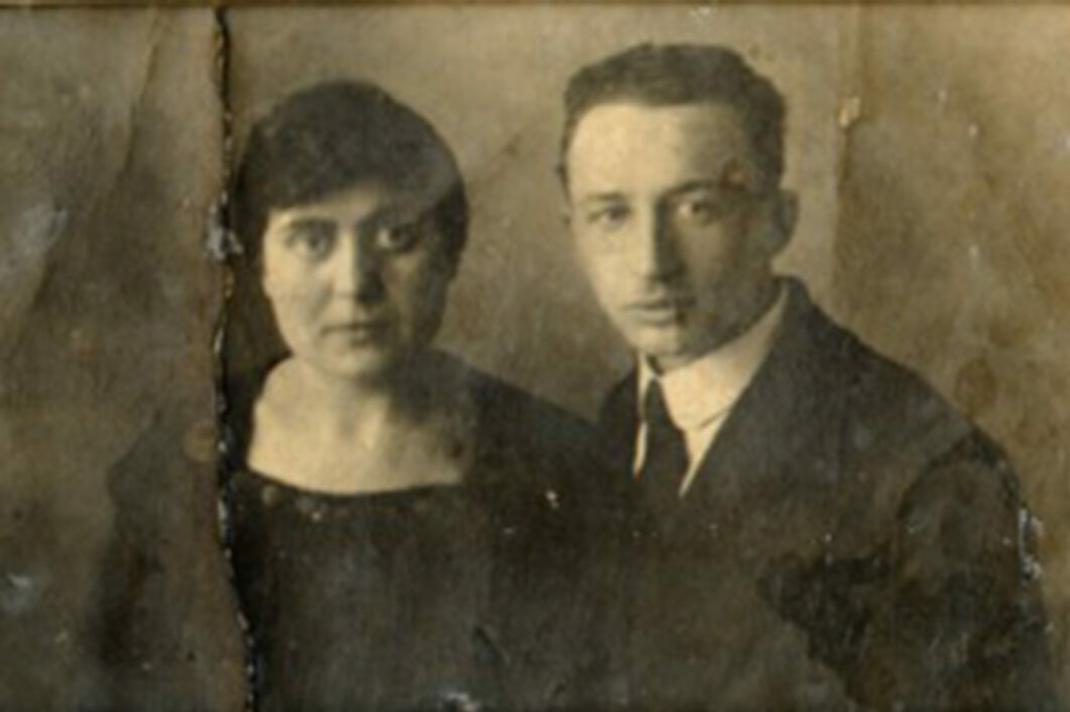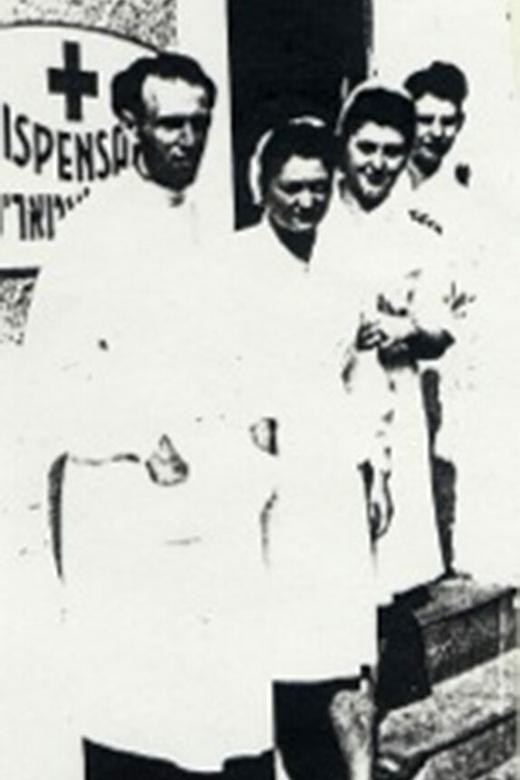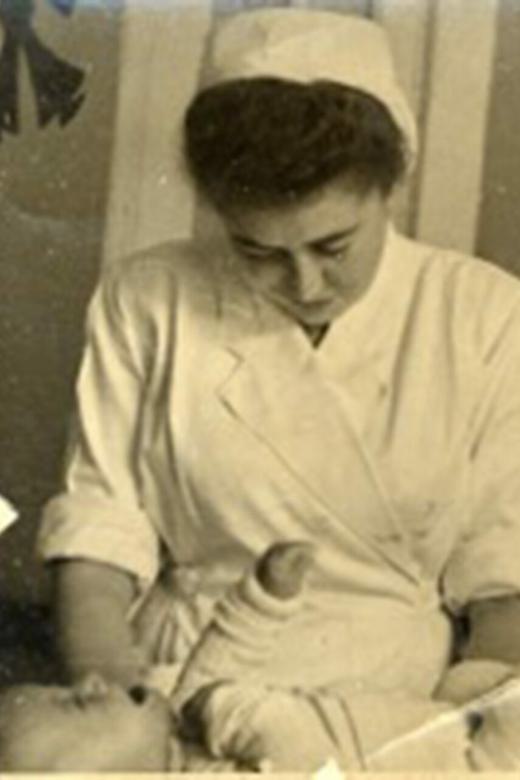Rose Brown

Born: Tuszyn, Poland, 1925
Wartime experience: Ghetto and camps
Writing partner: Jane Szilvassy
Rose Brown was born in the small town of Tuszyn, twenty kilometres south of Lodz in Poland, in 1925. In 1940, she and her family, like the other Jews in the area, were forced to live in the Lodz ghetto.
Rose was later sent to work in a forced labour camp. The rest of her family — her parents and three brothers — were eventually sent from the ghetto to Auschwitz-Birkenau, where all of them except her oldest brother, Henry, were murdered. After being liberated by the Soviet army, Rose lived in a displaced persons camp in Amberg, Germany. From there, she went to Belgium, where her brother had gone to join their uncle, and met David, with whom she moved to Toronto. In Toronto, Rose and David married, raised a family, created a successful business and were able to bring Rose’s brother Henry to Toronto.
One night, after I had been living in the ghetto for about four years, the Jewish police burst into the apartment like murderers.
Lodz Ghetto
Sure enough, the Germans invaded Poland on September 1, 1939, and the Nazis occupied Lodz seven days later. In early December, they started to round up all the Jews in Lodz and the surrounding area and brought them to what would become the ghetto. It so happened that Dworska Street where we lived was within the ghetto boundaries, so we didn’t have to move. However, one day a soldier brought a couple to our small apartment and said that they were going to live with us. There were only the two rooms, and we were already seven people living there. The other couple curtained off part of the long kitchen and left us the part with the stove. My brothers’ beds were moved into the other room, as well as my grandmother’s.
My father was aware of what the Nazis had been doing in Austria and Germany and knew that things would only get worse for us here in Poland. He thought we could get to the Soviet border and so he wanted us to escape while it was still possible. My grandmother, however, refused to go; my mother would not leave her and, naturally, my father would not abandon them. He took Henry and me aside and said, “You must go to Russia and take the other children with you. I will take you to the border.”
We cried and said, “But Father, we don’t want to leave you and we can’t take the children alone.”
My mother cried too, saying, “You are crazy, they can’t go alone!”
“Listen to me,” my father replied, “I know what I am doing, they should go.” Of course we didn’t go.
Wire fencing soon started to appear around the ghetto, and soldiers stood outside with guns. My grandmother took to her bed and refused to eat. I kept trying to tempt her to eat with little scraps of food, but it was useless — she refused everything and just turned her head to the wall. In the end, I just held her tight and she died in my arms. It was such a terrible time for us, and we cried for so long.
The ghetto was a nightmare. We had very little food, just watery soup and one chunk of bread each once a day. I tried to go to the high school in the ghetto but gave up because I was hungry all the time. You can’t learn when you’re hungry.
The soldiers would often come to round people up and take them away. We didn’t know where they were taken. One of the windows in our apartment looked out on the street, and one day, as Henry and I were looking out, we saw soldiers going house to house across the street, taking the men and loading them on trucks. Henry said, “Rushka, they are going to take our father.” I will never forget what we did. We watched until they got to the last house across the street and when they crossed to our side, we grabbed our father and ran across the road with him so he wouldn’t be there when they got to our side.
They didn’t see us. We made it!
My father survived four years in the ghetto. He worked in a workshop, cutting out the leather for the upper part of boots for the soldiers, those bandits, those Nazis. For this he got an extra piece of bread, which he brought home and shared with his children.

Deportation and Liberation
One night, after I had been living in the ghetto for about four years, the Jewish police burst into the apartment like murderers. I was sleeping in my parents’ bed, because there was no other room, and they grabbed me from the bed and dragged me out to a truck. I was screaming. They let my mother give me a skirt and a sweater to go over my nightgown. I had no shoes.
They took me to a place not very far away, some sort of barracks. There was no roof, but the walls were very high. I was crying hysterically. Suddenly, I heard my father’s voice. He had found out where I was and had brought my shoes. At home, we wore shoes that came up over the ankles, which my father had had made for us. It was a luxury very few other people had. I continued crying as he threw the shoes over the wall. I threw them back.
There was an older girl beside me and she said to me in Polish, “What are you doing, are you going to go without shoes?” My father didn’t give up. He threw them back, and I took them this time. It still hurts my heart that I never said thank you. So I had the shoes and the skirt and sweater my mother had given me. The sweater was a turtleneck I had knitted myself from scraps of wool all different colours. I wore it for many, many years and it got worn out and dirty. At the end of the war, I threw it away. I should have kept it as a memory of those awful times.
We were taken from that place to a camp in Częstochowa, where we were put to work in a munitions factory. It operated twenty-four hours a day with two shifts. My job was in an open area about the size of a small kitchen, filled with shells that were being coated with some sort of material. The smell was unbearable. I had to watch and listen and if I heard the slightest sound I had to stop the machinery. One night, when I was on the night shift, I must have been very tired and I dozed off. I didn’t hear the sound I was supposed to be listening for. It was my own fault; I should not have fallen asleep. Feisal, the Nazi in charge of the department, was furious. He said I could have ruined the whole production. He threw me down on the stone floor and beat me and kicked me. I thought he was going to kill me. The other girls working at the tables were all crying. I lay there for about an hour, unable to get up. The other girls picked me up and took me to my bunk. Strangely enough, it would be Feisal to whom I would owe my life at the end of the war.
Although we had more food than in the ghetto — a bowl of soup and a chunk of bread three times a day — after I had been in the camp for a while I developed a swollen leg as a result of malnutrition. I couldn’t work and was taken to a mobile hospital in the camp. After a few weeks, my leg was still so bad that I couldn’t walk. I had a friend from Lodz in the camp, Guta Kleptner. She and her brother had been our neighbours, and I was very fond of her. I don’t know what became of her. After the war, I searched all over for her but found no trace. One day, she came to visit me in the hospital. “Listen,” she said, “I have heard a rumour that they are going to take everyone who is sick and send them to Auschwitz.” I said, “What are you talking about?” I don’t know how she knew. The Nazis had wanted to get rid of me and ship me to Auschwitz. I was just garbage to them.
The Nazis were standing right across the road from the hospital. She said, “When it’s dark I will come and help you out, but you’ll have to open the window from the inside.” My bed was by the window, and when darkness fell I somehow managed to open the window. She dragged me through to the outside and then held me up, hopping on one leg, all the way to my barracks. There were three bunks, and mine was in the middle. It took her and two other girls to get me up there. She had saved my life.
I lay there for two months with my bad leg. Meanwhile, the other girls would bring me my food ration. The German in charge of the camp, an older man called Meisner, must have known that I was not working and that the girls were bringing me food, but he didn’t say or do anything. Gradually, my leg got better, and I went back to work. Meisner called me in, and I thought that was the end of me, but he just said, “You thought you were going to die. You won’t die so fast,” and sent me back to work. He had known the whole time that I wasn’t working. I don’t know why he acted like that. Maybe he had a conscience.
***
As the end of the war approached, the Nazis started shipping everybody out of the camp. We had no idea where they were taking us when they started loading us all onto trains. I was in front of a girl called Marla and had one foot on the train and was just about to put the second on when suddenly Feisal appeared behind us and pulled us both away from the train. I thought, He hates me, what is he going to do to me now?
He took us to a filthy room with very high windows. There was a dirty old red blanket on the floor and we sat huddled together under it, crying. We expected him to come any minute and finish us off. All of a sudden, we heard some boys outside shouting in Polish, “Girls, the war is over!”
We didn't believe them. One told us to go open the door, and we replied, “The door is locked!”
They said, “No it isn't,” and when we checked, it was open!
We looked out to the gates of the camp, and they were also open. Marla, who was older and understood more than me, said, “Let’s go to the woods.” As we walked and walked, grenades fell all around and fire surrounded us. Then we heard a voice saying in German, “They are Jews.” Marla, who spoke German said, ”No, we are not Jews. We are German.”
We walked on, not knowing where we were going. Then, we saw a faint light coming from a house. We knocked and asked if we could come in but were told, “No, we can't, they will kill us.”
The same thing happened when we tried a second house. Finally, at a third house, a Polish guy opened the door, pulled us in and led us down to the basement. Basements in Poland were awful, dark, damp places full of rats. We sat on the top step wrapped in the dirty red blanket, frightened and shaking. Then the man came and gave us a big bowl of soup and said, “Girls, the war is over. The Soviets are here.” We didn't believe him. He opened the door, and we thought he wanted to get rid of us. He said, “Come and see.”
We got up and looked — it was true! It was dark by now — we had sat all day crying on that red blanket. His house must have been close to the city. I could see the street lights of Częstochowa in the distance.
Now a new chapter in my life started.



